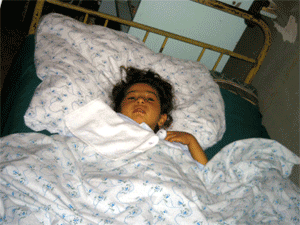Tbilisi Medical Center for Critical Care (TMCC) Refused Treatment to 4-year-old girl
February 25, 2008
 Gulo Kokhodze, Akhaltsikhe
Gulo Kokhodze, Akhaltsikhe
On February 18 Badinda Bastova, 4 ½ years months little girl was brought to Akhaltsikhe District Hospital fighting a complicated form of Hepatitis A. Now this child is being cared for in the Infection Department of Tbilisi Central Hospital. 10 days earlier all hospitals in Tbilisi had refused treatment on the grounds that they had no place.
Badina has been living in village Abastumani, Adigeni District with her 7 brothers and sisters for the last year. Since she is a Meskhi-Georgian by ethnic classification, which is a Georgian Muslim by religion. Badina's family thinks that her religion was the main reason for TMCC refusing treatment to the child. This group was deported from Georgia during the regime of Joseph Stalin over 50 years ago. They have only recently been allowed to return when Georgia reached an agreement with the Council of Europe, as they were Georgian citizens, and it is illegal to deport people from their native land.
Bandidar Basatova lives in village Abastumani (Adigeni Municipality) with her family. Her family arrived to Georgia a year ago, they are Muslim Meskhs; their historic last name is Lortkipanidze.
“The parents did not notice the symptoms of illness on time; consequently, they did not follow a proper diet. The patient then went into a coma because of her health complications. Now she is suffering from the first and second degrees of decreased liver capacity. We are trying our best”, says Nunu Abdushelishvili, doctor specializing in infectious diseases.
The child’s health condition deteriorated after two days of being transported to hospital. Consequently, the doctors of Akhaltsikhe District Hospital decided to call for an ambulance from Medical Center for Emergency Situations to provide for Bandidar’s transportation to Tbilisi. The ambulance arrived to Akhaltsikhe and brought medicines. However, it was impossible to take the child to Tbilisi, because Tbilisi hospitals had refused to receive the child on the grounds that they had no places in infection departments.
“There is currently quarantine in effect in the Emergency Care Department of the Central Hospital. Patients are suffering from an outbreak of chickenpox. They called to other hospitals as well in seeking treatment. However, still there were no beds. This disease is contagious, therefore it is inadmissible to place the child in common department with others who are infected. It is necessary to keep her separately”- this is how Nunu Abdushelishvili explains the rejection by hospitals. Nunu Abdushelishvili was very attentive to the child and did not leave her for a moment, constantly by her bedside, even at night.
Tsira Meskhishvili, head of the Non Governmental Organization “Tolerant” is surprised by the refusal of hospitals. She says that it was only because of some highly devoted doctors that the child survived: “These people do not leave the child even for a moment. I do not know why no Tbilisi hospitals would accept the child. If something happens to the child who will be responsible? You agreed to bring back Muslim Meskhs, so take the responsibility for them being in the country. We were departed and after all these years we are allowed to return. The government accepted its obligations and that means that it should be responsible for the health and welfare of all its citizens.
Nunu Abdushelishvili says that they continue to treat Bandidar in Akhaltsikhe with the help of phone consultations from the head of Emergency Department of Hepatitis Department of Tbilisi Central Hospital. “The child’s health conditions have improved but we consider that it is still necessary to transfer the child to Tbilisi”, stated Nunu Abdushelishvili on February 21.
On February 22, as Badindar condition had not improved. She was feeling very ill. The infection Department of Tbilisi Central Hospital was finally able to find a place for her and the child was then transferred.
Bandidar has seven brothers and sisters. There is a threat that they might become ill as well. The doctors expect that Bandidar was infected from her brother who was ill with hepatitis at the end of December.
News
December 13, 2023
Ethnic minorities outside the peace dialogue
November 6, 2023
‘Peace’ agenda of political parties
Popular
Articles
February 13, 2024



